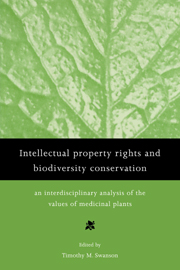 Intellectual Property Rights and Biodiversity Conservation
Intellectual Property Rights and Biodiversity Conservation Book contents
- Frontmatter
- Contents
- List of contributors
- Preface
- Acknowledgements
- 1 Diversity and sustainability: evolution, information and institutions
- Part A Plant communities and the generation of information
- Part B The value of plant-generated information in Pharmaceuticals
- Part C The institutions for regulating information from diversity
- Part D The importance of cultural diversity in biodiversity conservation
- 9 Medicinal plants, indigenous medicine and conservation of biodiversity in Ghana
- 10 Biodiversity and the conservation of medicinal plants: issues from the perspective of the developing world
- Index
9 - Medicinal plants, indigenous medicine and conservation of biodiversity in Ghana
Published online by Cambridge University Press: 21 January 2010
- Frontmatter
- Contents
- List of contributors
- Preface
- Acknowledgements
- 1 Diversity and sustainability: evolution, information and institutions
- Part A Plant communities and the generation of information
- Part B The value of plant-generated information in Pharmaceuticals
- Part C The institutions for regulating information from diversity
- Part D The importance of cultural diversity in biodiversity conservation
- 9 Medicinal plants, indigenous medicine and conservation of biodiversity in Ghana
- 10 Biodiversity and the conservation of medicinal plants: issues from the perspective of the developing world
- Index
Summary
Introduction
The value of biodiversity as a source of pharmaceutically active substances has been the subject of a number of studies, for example Pearce and Puroshothaman (this volume), McNeely (1988), Farnsworth and Soejarto (1985) and Principe (1991). This value is now being cited as one of the many arguments for conserving natural habitats and, in particular, tropical forests which contain the largest number of plant species. These analyses, however, ignore the additional role of these as sources of medicines in the form of herbal treatments used by the majority of people in developing countries. Furthermore, this direct local use of plant resources contributes to the preservation of species and habitats, and can be used as the basis for conservation policies centred on indigenous management regimes and utilisation. The success of such policies depends on the allocation of property rights and the cultural status of herbal medicine which could be an important component of primary health care in developing countries, as advocated by the World Health Organization.
Recent attempts to value non-timber forest products and in particular medicinal plants (Balick and Mendelsohn, 1992) have examined only the current local market value of these products and have not attempted any in-depth evaluation of the benefits to rural communities of traditional health strategies.
- Type
- Chapter
- Information
- Intellectual Property Rights and Biodiversity ConservationAn Interdisciplinary Analysis of the Values of Medicinal Plants, pp. 201 - 231Publisher: Cambridge University PressPrint publication year: 1995
- 6
- Cited by
